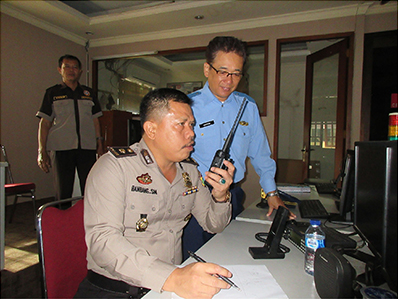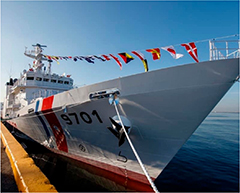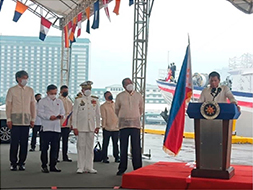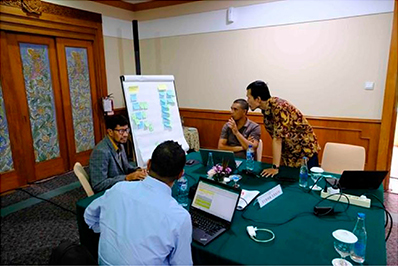(3) Assistance for Stability and Security
Transnational organized crime and acts of terrorism continue to pose a threat to the entire international community. Effective response to these threats cannot be achieved by the efforts of a single nation alone. Therefore, in addition to strengthening countermeasures by individual nations, the entire international community must work together through assistance to build capacity in the fields of justice and law enforcement in developing countries.
● Japan’s Efforts
A. Enhancing the Capabilities of Security Authorities

A Japanese expert providing instruction in the field of communication and command control under the technical cooperation “Project on Nationwide Capacity Development of Police Officers for POLMAS-Indonesian Civilian Police Activities” in Indonesia (Photo: JICA)
Based on the track records and experiences of the Japanese police in international cooperation, they provide support for establishing systems, improving administrative capacities, and developing human resources, while transferring knowledge and skills to police agencies in developing countries, who play a key role in maintaining security.
As one of the examples, in 2022, the National Police Agency (NPA) of Japan dispatched experts to Indonesia, and also provided online training for the officials of Asian, African, and Oceanian countries, showing how police are trusted by the people in Japan.
B. Counter-Terrorism
The environment surrounding terrorism has changed greatly as a result of the spread of COVID-19. Although the restrictions on movement due to the pandemic have reduced terrorism in urban areas, the increasing dependence of people on information and communication technology (ICT) facilitates the spread of extremism by extremist groups using the internet and social media. In some areas where the governing capacity of the nation was already vulnerable, the pandemic has further degraded the governance and helped expand the scope of terrorist organizations’ activities. Some have pointed out the possibility of a number of terrorist attacks as a result of the easing of movement restrictions that were a countermeasure against COVID-19.
In 2022, Japan implemented various projects through international organizations in order to promptly respond to changes in the environment surrounding terrorism. Such projects include the capacity building against violent extremism and educational support for Maldivian youth and women in partnership with the United Nations Development Programme (UNDP) (approximately 180,000 US dollars). Japan also contributed 450,000 US dollars to the United Nations Office on Drugs and Crime (UNODC) for a project to build the capacity of criminal justice authorities in nine countries in Southeast Asia to respond to online and offline exploitations by terrorists in the context of the COVID-19 pandemic.
C. Measures against Transnational Organized Crime
Japan, as a State Party to the UN Convention against Transnational Organized Crime (UNTOC), a legal framework for preventing transnational organized crime including terrorism, is promoting international cooperation that includes mutual legal assistance based on the Convention. Additionally, Japan mainly provides the following international cooperation.
■ Countermeasures against Illegal Drugs
While actively participating in relevant international conferences such as the Commission on Narcotic Drugs (CND) under the UN, Japan proactively makes efforts to combat illegal drugs as an issue to be tackled globally. In 2022, Japan provided financial contributions to the UNODC to monitor the distribution of illegal drugs, including new compounds, Note 43 strengthen border control capabilities, and continuously survey the illegal cultivation of opium poppy, a raw material used in drug production, in cooperation with related organizations in Southeast Asian and Central Asian countries.
In addition, the NPA of Japan holds discussions on the regional drug situation and relevant investigational measures as well as on modes of international cooperation with countries mainly in the Asia-Pacific region in order to build mutually beneficial cooperative structures for collectively working on the world drug problem.
■ Measures against Trafficking in Persons
Based on the “Protocol to Prevent, Suppress and Punish Trafficking in Persons Especially Women and Children,” a comprehensive international agreement concerning trafficking in persons, Note 44 and Japan’s “2014 Action Plan to Combat Trafficking in Persons,” Japan is engaged in various efforts to eradicate trafficking in persons. Under this Action Plan, the Government of Japan releases annual reports on its efforts to combat trafficking in persons, while also strengthening cooperation with various ministries, agencies, relevant organizations, and NGOs. In 2022, Japan formulated the “2022 Action Plan to Combat Trafficking in Persons” in order to further enhance and strengthen countermeasures against trafficking in persons.
Japan provides support to victims of trafficking in persons identified in Japan through its contribution to the International Organization for Migration (IOM), toward their safe repatriation to their respective home countries and their independence and social rehabilitation through the provision of education and vocational training. Japan also supports measures against trafficking in persons and efforts to strengthen the law enforcement capacity in Southeast Asia and the Middle East, through bilateral technical cooperation and financial contributions to projects delivered by UNODC and other UN agencies. Japan further provides financial contributions to and participates in the Bali Process, an Asia-Pacific regional framework against people smuggling, trafficking in persons, and related transnational crime.
■ International Measures against Money Laundering and Terrorist Financing
There is a high risk for the profits of transnational organized crime to be used to fund further organized crime or acts of terrorism, and thus, eliminating such flows of illicit funds is an important task for the international community. Therefore, Japan actively participates in discussions on international measures against money laundering Note 45 and terrorist financing through intergovernmental frameworks such as the Financial Action Task Force (FATF). Note 46 In order to implement effective global measures against money laundering and terrorist financing, each country needs to properly implement the international standards in this field set by the FATF so as not to create loopholes in the measures. Assistance for countries and regions with insufficient capacity and resources to deal with money laundering and terrorist financing will contribute to the improvement of international measures to counter money laundering and terrorist financing. Therefore, Japan provides assistance for FATF-style Regional Bodies, which promote the effective implementation of the FATF standards in non-FATF member countries, with a particular focus on supporting activities such as technical assistance conducted by the Asia Pacific Group on Money Laundering (APG), an FATF-style Regional Body in the Asia-Pacific region.
D. Capacity Building for Maritime, Outer Space, and Cyberspace Issues
■ The Seas
As a maritime nation, Japan depends on imports for a large part of its energy resources and food, and therefore, ensuring marine traffic safety, including through addressing threats to maritime transport, is an issue that directly affects Japan’s existence and prosperity. Moreover, an open and free international order of the seas based on the rule of law is extremely important not only for the realization of a Free and Open Indo-Pacific (FOIP) promoted by Japan but also for the economic development of the entire region including Japan (see “ODA Topics” regarding initiatives for the realization of a Free and Open Indo-Pacific (FOIP)).
In order to establish and promote the rule of law at sea, Japan seamlessly supports the improvement of the law enforcement capacity of maritime security agencies in the Indo-Pacific region through the provision of patrol vessels and technical cooperation, while promoting cooperation for capacity building in Maritime Domain Awareness (MDA) among recipient countries. Specifically, Japan carries out human resources development through the training and dispatch of experts for maritime countries along sea lanes including Indonesia and Malaysia, in addition to providing vessels and maritime security-related equipment to Viet Nam, the Philippines, and other countries. Furthermore, Japan provides patrol vessels and other equipment related to maritime security and safety to Pacific Island countries such as the Federated States of Micronesia and Samoa (see “Project Introduction Column” for efforts in the Philippines).
As an effort to promote regional cooperation in countering piracy and armed robbery against ships in the Asia region, Japan leads the formulation of the Regional Cooperation Agreement on Combating Piracy and Armed Robbery against Ships in Asia (ReCAAP), and supports the activities of ReCAAP-ISC, an information sharing center established based on the ReCAAP. Since 2017, Japan has implemented comprehensive training aimed at capacity building for maritime law enforcement agencies of the ReCAAP Contracting Parties, Note 47 among others. In 2022, a total of 21 countries, namely 19 ReCAAP Contracting Parties plus Indonesia and Malaysia, participated in the training that was held online due to COVID-19. Best practices were shared by each country, which contributed to deepening the anti-piracy-related knowledge of the participating countries and to promoting cooperation among coastal countries.
In order to counter the threat of piracy off the coast of Somalia and in the Gulf of Aden in Eastern Africa, Japan has been conducting anti-piracy operations since 2009. Moreover, Japan contributed a total of 15.53 million US dollars to the Djibouti Code of Conduct Trust Fund, which was founded by the International Maritime Organization (IMO) to implement the Djibouti Code of Conduct. Note 48 This Trust Fund was used to establish information-sharing centers for anti-piracy measures and the Djibouti Regional Training Centre. Training programs to improve maritime security capacities in countries neighboring Somalia have been held at the Regional Training Centre, and in 2022, workshops were held in March and June.
Also, in cooperation with the Japan Coast Guard, maritime law enforcement training courses are carried out with the participation of maritime security officers from the countries surrounding Somalia. In 2022, 18 officers from 15 countries in total participated in the courses. Furthermore, with the understanding that the reconstruction and stability of Somalia are essential for a fundamental solution to the piracy issue in the area, since 2007, Japan has disbursed a total of approximately 550 million US dollars for the restoration of basic social services, improvement of policing capability, and revitalization of domestic industries in Somalia.
Oil spillages from ships that occur on sea lanes not only have an impact on the safe navigation of ships passing through, but can also cause fatal damage to the fishery and tourism industries of coastal countries by polluting the coast. Hence, it is important to strengthen the capacity for dealing with such oil spill incidents. As part of the cooperation in response to the oil spill from a bulk carrier off the coast of Mauritius in 2020, Japan signed exchanges of notes for grant aid to provide equipment to strengthen maritime safety capabilities in February and August 2021. Additionally in August, Japan decided to provide technical cooperation to restore and conserve coastal ecosystems as well as to restore and improve the livelihoods of local fishermen and residents. Japan will continue to support the medium- to long-term economic development of the country through the steady implementation of these assistances.
Furthermore, the International Hydrographic Organization (IHO) has been conducting a training program in the United Kingdom every year since 2009 with the aim of nurturing nautical chart experts in developing countries. This program is carried out with grant assistance from The Nippon Foundation and the participation of the Hydrographic and Oceanographic Department of the Japan Coast Guard in the management of the program. The training program produced 72 graduates from 41 countries by December 2021. The IHO and Intergovernmental Oceanographic Commission (UNESCO-IOC) are engaged in a joint project to create the General Bathymetric Chart of Oceans (GEBCO), a topographical map of the world’s seafloor. The map is under revision through the cooperation of experts around the world, including the Hydrographic and Oceanographic Department of the Japan Coast Guard.
Philippines
Ensuring Maritime Safety in the South China Sea
Maritime Safety Capability Improvement Project for the Philippine Coast Guard (Phase 2)
Loan Aid (October 2016 onwards)
The Philippines is a maritime nation consisting of more than 7,000 islands with a coastline of approximately 36,000 km, and maritime transport plays a major role in the country’s economic and social development. However, the number of maritime accidents doubled in 2015 over the past five years, due to an increase in passenger and cargo transport, as well as aging vessels and improper operations such as overloading. In addition, the risk of maritime crime is also increasing, and strengthening measures to deal with smuggling, poaching, terrorism, and other problems has become one of the important issues.
The Philippine Coast Guard (PCG), responsible for maritime safety and maritime law enforcement, had an absolute shortage of vessels and could not adequately take emergency response in the event of maritime accidents or appropriate actions against crimes such as smuggling. Against this backdrop, Japan decided to provide two 97-meter class patrol vessels,Note 1 the largest in the country, through loan aid with the aim of improving PCG’s capabilities for maritime rescue and maritime law enforcement operations offshore and in coastal areas.
These patrol vessels were built in Japan amid the COVID-19 crisis owing to the efforts of the parties concerned from both countries. Despite a challenging situation where people could not easily visit each other to discuss the details of the vessels’ design and manufacturing, the two patrol vessels were successfully commissioned in the Philippines in May and June 2022 respectively, after a period of preparation including training for ship operators. The patrol vessels, built with Japan’s cutting-edge technology, are expected to ensure the maritime security surrounding the Philippines, contributing to the realization of a “Free and Open Indo-Pacific (FOIP),” which upholds the commitment for peace and stability based on the rule of law.

PCG’s Patrol Vessel BRP Teresa Magbanua, commissioned in May 2022 (Photo: JICA)

Then President of the Republic of the Philippines Duterte delivering a speech at the commissioning ceremony of BRP Melchora Aquino
Note 1: The vessels have a length of approximately 96.6 m, a maximum speed of 24 knots, and a cruising range of more than 4,000 nautical miles. In addition, they are also equipped with devices and equipment necessary for maritime situational awareness and maritime law enforcement activities including telecommunications equipment capable of monitoring the Exclusive Economic Zone (EEZ), facility for helicopters, remotely operated unmanned underwater vehicles, and high-speed work boats. They play a particularly important role in rescue operations in stormy weather and patrols in offshore and coastal areas.
■ Outer Space

Moldova’s CubeSat being deployed from “Kibo” on August 12, 2022 (Photo: JAXA/NASA)
Japan contributes to addressing global issues including climate change, disaster risk reduction, marine/fisheries resource management, forest conservation, and resources/energy through the implementation of development cooperation and capacity building assistance utilizing space technology. Japan also proactively provides assistance in the field of human resources development for emerging countries in their efforts toward the development and utilization of outer space. In particular, initiatives by Japan, such as providing opportunities for space experiments and the development of small satellites that make use of the Japanese Experiment Module “Kibo” aboard the International Space Station (ISS), are highly acclaimed in the international community. In August 2022, Moldova’s first CubeSat was deployed through the “KiboCUBE” program. Note 49 Prime Minister Gavrilita and other officials in the country watched the deployment via live broadcast, which showed the high expectations for Japan’s space cooperation in the country.
Japan formulated a basic policy in 2016 to strategically and effectively provide all-Japan support for the capacity building of emerging space faring nations and has actively supported such nations. For example, Japan is conducting forest monitoring in 78 countries in the regions of Asia, Africa, and Latin America and the Caribbean, utilizing a tropical forest monitoring system (JICA-JAXA Forest Early Warning System in the Tropics: JJ-FAST) that uses satellite data from “ALOS-2.” At TICAD 8 held in 2022, Japan pledged to conduct regular monitoring of forests utilizing JJ-FAST and to train 100 people in 43 African countries with tropical forests, as well as to train a total of 800 forest management officials in 10 African countries.
In addition, in order to contribute to the realization of the rule of law in outer space, Japan provides capacity building assistance to emerging space faring nations in the development and operation of domestic space-related laws. Since the announcement of Japan’s cooperation with the UN Office for Outer Space Affairs (UNOOSA)’s “Space Law for New Space Actors” project in May 2021, Japan has been providing assistance to emerging space faring nations in the Asia-Pacific region for the development and operation of domestic space-related laws. Japan also contributes to building the legal capacity needed to properly manage and supervise their space activities, including private-sector activities. In 2022, Japan conducted tailor-made legal capacity building assistance for Malaysia, the Philippines, and Thailand.
■ Cyberspace

Third-country training on cyber security conducted under the technical cooperation “Project for Human Resources Development for Cyber Security Professionals” in Indonesia (Photo: JICA)
In recent years, it has become a pressing task to take measures against threats to a free, fair, and secure cyberspace. It is thus necessary for diverse actors in each country to work together in order to respond to this issue. The lack of security-related awareness and response capacity in some countries, including developing countries, poses a significant risk to the entire world, including Japan. Therefore, strengthening cooperation for ensuring the security in cyberspace of countries around the world and providing capacity building support to developing countries not only contribute to the recipient countries, but also benefit the entire world including Japan.
Japan has strengthened cooperation with ASEAN through the ASEAN-Japan Cybercrime Dialogue and the Japan-ASEAN Information Security Policy Meeting. Japan continuously conducted cyber exercises and tabletop exercises with ASEAN member states in 2022. In addition, through the International Criminal Police Organization (INTERPOL), Japan supported the strengthening of the investigative capacity of officials at law enforcement related agencies to deal with crimes committed in cyberspace, which increased under the COVID-19 pandemic.
Furthermore, the ASEAN-Japan Cybersecurity Capacity Building Centre (AJCCBC) was launched in Bangkok, Thailand, utilizing the Japan-ASEAN Integration Fund (JAIF) Note 50 that was established with contributions by Japan among other stakeholders. At the Centre, Japan provides the Cyber Defense Exercise with Recurrence (CYDER), a practical exercise targeted at cybersecurity personnel of government agencies and critical infrastructure operators in ASEAN countries, and promotes cooperation in capacity building in the area of cybersecurity in ASEAN. In the midst of the COVID-19 pandemic, from the perspective of sustainable training implementation, Japan made all of its independent study materials and face-to-face exercise programs available online. Face-to-face training resumed in October 2022, and the Cyber SEA Game, which is a cyber security skills competition among young engineers, was held in person at the first time in the last two years.
Japan also contributed to the World Bank’s Cybersecurity Multi-Donor Trust Fund and works on capacity building assistance in the field of cybersecurity for lower middle income countries.
The NPA has conducted training for staff engaged in combatting cybercrimes at the People’s Public Security of Viet Nam since 2017, with the aim of helping them acquire the knowledge and skills for dealing with cybercrimes, as well as strengthening cooperative relations between the security agencies of Japan and Viet Nam.
Furthermore, since FY2018, the Ministry of Economy, Trade and Industry has been conducting exercises on cybersecurity for industrial control systems in important infrastructure sectors, such as electricity and gas, targeting the Indo-Pacific region, with the cooperation of experts from the governments and private sectors of Japan and the United States every fiscal year. Since FY2021, the EU has participated as an organizer in the exercises.
- Note 43: New Psychoactive Substances (NPS). Also known as “designer drugs.” These are substances that are produced synthetically to have effects similar to controlled drugs (narcotics, etc.). They are not recognized as legal medicines, and are compounds that exhibit unregulated psychotropic effects.
- Note 44: The act of recruitment, transportation, transfer, harboring, or receipt of persons for the purpose of exploitation, such as forced labor or prostitution (Article 3 (a) of the Protocol to Prevent, Suppress and Punish Trafficking in Persons Especially Women and Children).
- Note 45: The act of disguising criminal proceeds as legally obtained assets, or the act of hiding such funds. One example is the act in which a drug dealer hides money gained through drug trafficking in a bank account opened under a false name.
- Note 46: Established based on the Economic Declaration of the Arch Summit (G7 Summit) in 1989.
- Note 47: The 21 countries are Australia, Bangladesh, Brunei, Cambodia, China, Denmark, Germany, India, Japan, the Republic of Korea, Laos, Myanmar, the Netherlands, Norway, the Philippines, Singapore, Sri Lanka, Thailand, the United Kingdom, the United States, and Viet Nam.
- Note 48: A regional cooperation framework for Somalia and its neighboring countries.
- Note 49: A cooperative framework between the UN Office for Outer Space Affairs (UNOOSA) and the Japan Aerospace Exploration Agency (JAXA) that provides developing countries with the opportunity to deploy CubeSats from “Kibo.”
- Note 50: See Note 4.
